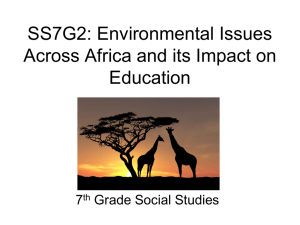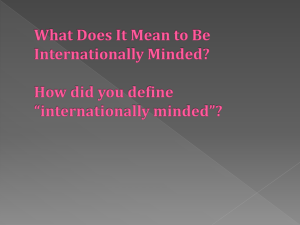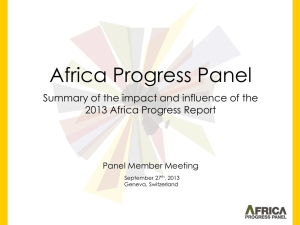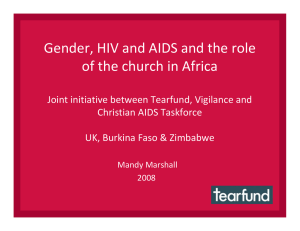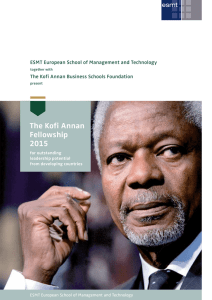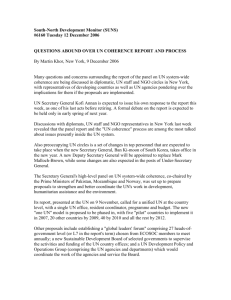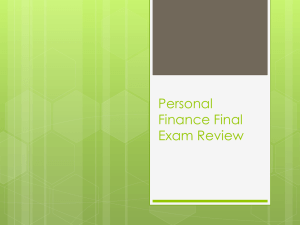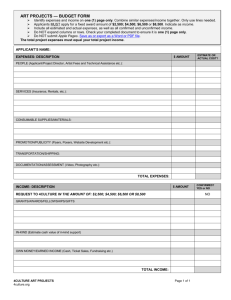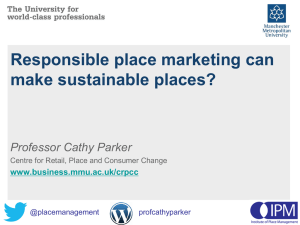Policy Plan - Kofi Annan Business School Foundation
advertisement
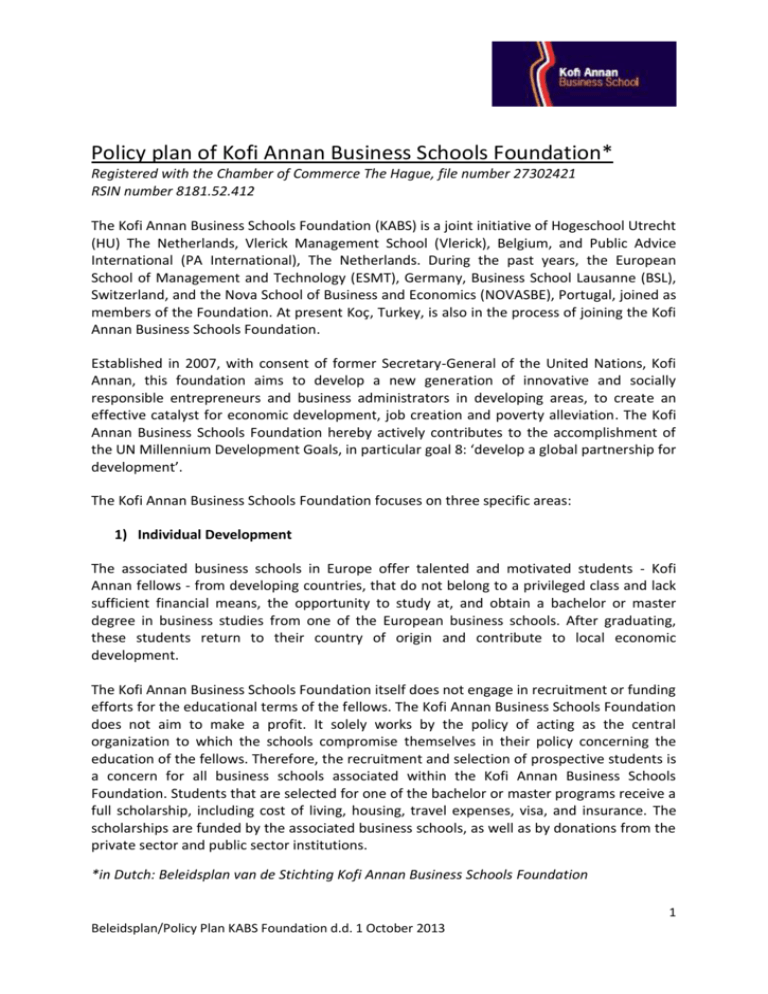
Policy plan of Kofi Annan Business Schools Foundation* Registered with the Chamber of Commerce The Hague, file number 27302421 RSIN number 8181.52.412 The Kofi Annan Business Schools Foundation (KABS) is a joint initiative of Hogeschool Utrecht (HU) The Netherlands, Vlerick Management School (Vlerick), Belgium, and Public Advice International (PA International), The Netherlands. During the past years, the European School of Management and Technology (ESMT), Germany, Business School Lausanne (BSL), Switzerland, and the Nova School of Business and Economics (NOVASBE), Portugal, joined as members of the Foundation. At present Koç, Turkey, is also in the process of joining the Kofi Annan Business Schools Foundation. Established in 2007, with consent of former Secretary-General of the United Nations, Kofi Annan, this foundation aims to develop a new generation of innovative and socially responsible entrepreneurs and business administrators in developing areas, to create an effective catalyst for economic development, job creation and poverty alleviation. The Kofi Annan Business Schools Foundation hereby actively contributes to the accomplishment of the UN Millennium Development Goals, in particular goal 8: ‘develop a global partnership for development’. The Kofi Annan Business Schools Foundation focuses on three specific areas: 1) Individual Development The associated business schools in Europe offer talented and motivated students - Kofi Annan fellows - from developing countries, that do not belong to a privileged class and lack sufficient financial means, the opportunity to study at, and obtain a bachelor or master degree in business studies from one of the European business schools. After graduating, these students return to their country of origin and contribute to local economic development. The Kofi Annan Business Schools Foundation itself does not engage in recruitment or funding efforts for the educational terms of the fellows. The Kofi Annan Business Schools Foundation does not aim to make a profit. It solely works by the policy of acting as the central organization to which the schools compromise themselves in their policy concerning the education of the fellows. Therefore, the recruitment and selection of prospective students is a concern for all business schools associated within the Kofi Annan Business Schools Foundation. Students that are selected for one of the bachelor or master programs receive a full scholarship, including cost of living, housing, travel expenses, visa, and insurance. The scholarships are funded by the associated business schools, as well as by donations from the private sector and public sector institutions. *in Dutch: Beleidsplan van de Stichting Kofi Annan Business Schools Foundation 1 Beleidsplan/Policy Plan KABS Foundation d.d. 1 October 2013 2) Institutional Development Since 2010, the Kofi Annan Business Schools Foundation is actively expanding the number of associated business schools in Europe, as well as of business schools in Africa, Asia, and Latin America which participate in the programs. This expansion not only further increases the outreach of the initiative by providing even more opportunities for talented students from developing areas, it is also an essential prerequisite to meet the ambition of developing an effective platform of knowledge on entrepreneurship. Within this platform of knowledge, the associated business schools seek active cooperation to exchange expertise and best practices in the area of business development among themselves and with the participating schools abroad. This institutional cooperation, both in education as well as research, contributes to local capacity building at business schools in Africa, Asia, and Latin America, and further strengthens the entrepreneurial capacity and capability of citizens and enterprises in developing areas. 3) Private Sector Development Entrepreneurial activity can be found everywhere throughout Africa, Asia, and Latin America, but its contribution to GDP generally is significantly lower than in other regions. Starting up a business in developing areas often requires more creativity and greater resilience, but it also offers huge economic potential. The market is generally not as competitive, and there still is an unmet demand for many goods and services. Both government and market deficiencies can serve as an incentive for disruptive innovations. In cooperation with local business schools, local private sector, and public sector institutions in Africa, Asia and Latin America, the associated business schools now also develop initiatives to stimulate and support centers for entrepreneurship and business incubation programs for young, innovative entrepreneurs in developing countries. The objective is to create an environment where innovative entrepreneurship can flourish, which in turn can generate local multiplier effects that promote potential demand for new firms. Board: The board of 2013 was formed by: Prof. Dr. J.A. van Ginkel Drs. G.T.C. Bonhof- van der Waals - (HU) Prof. Dr. Ph. Haspeslagh - (Vlerick) Prof. Dr. W. Plinke - (ESMT) Dr. Katrin Muff - (BSL) Dr. Catia Batista - (NOVASBE) Chair Secretary Treasurer Member of the Board Member of the Board Member of the Board Drs. M.J. van Breene Executive Secretary 2 Beleidsplan/Policy Plan KABS Foundation d.d. 1 October 2013 The Board members have joint authority. Concerning bookkeeping on a day-to-day basis the executive secretary is authorized to pay up to 2.500 euro but only after consulting the Chair. For higher amounts the Chair can decide, and in case of considerable expenses, the treasurer will be involved and other members will be sought for advice. See minutes from the board meeting December 2008. This was reconfirmed in October 2011. The Kofi Annan Business Schools Foundation explicitly does not aim to make a profit. Since the start of the Kofi Annan Business School Foundation in 2007, considerable numbers of companies, institutions, and organizations have contributed to the Foundation, both financially and in kind. For instance for the academic year 2012-2013, the Kofi Annan Business School Foundation was supported by the Gaia Foundation, K.F. Heinfonds, Noaber Foundation, Rabobank Foundation, SSH, ESMT Gesellschaft der Freunde und Förderer e.V, MAN Studienstiftung, Institute for Social Studies, Deloitte, Calculations, VU Talencentrum, and Ontwerpwerk. Expenses: KABS has a lean but solid functioning base and infrastructure. The financial annual report shows further details on this matter. Personnel costs. Permanent staff of the foundation is consisting of - Prof. dr. Hans van Ginkel, who is not rewarded financially in any way, solely compensated for expenses made. - The executive secretary is hired on a smallest as possible contract (O,1 fte) from the Hogeschool Utrecht. Expenses made are mostly in the field of accountability (Deloitte, Calculations, Wereldadministratie), maintaining social media such as Website (Ontwerpwerk) and office and operating costs. For the total overview of the expenses, see paragraph 2.2 in the financial report. Appendices: - Statutes - Financial annual report 2012 - Abstract of the Chamber of Commerce, The Hague MB/17/09/13 3 Beleidsplan/Policy Plan KABS Foundation d.d. 1 October 2013
